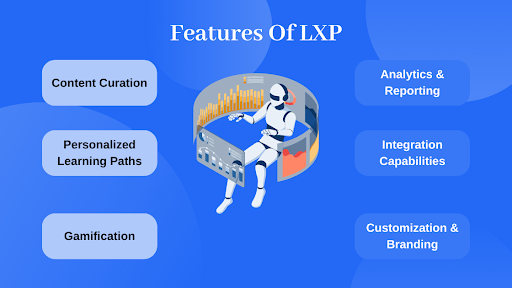Best Learning Experience Platform (LXP) 2025: Complete Guide
In a world where digital learning continues to evolve rapidly, choosing the best Learning Experience Platform (LXP) can be a game-changer for organizations and learners alike. As we move into 2025, the demand for personalized, intuitive, and data-driven learning platforms is at an all-time high. In this guide, we’ll explore what a Learning Experience Platform is, how it differs from traditional LMS platforms, the key features to look for in 2025, and our top LXP recommendations for the year.

What is a Learning Experience Platform (LXP)?
A Learning Experience Platform (LXP) is an AI-powered learning software designed to deliver personalized learning experiences to users. Unlike traditional Learning Management Systems (LMS) that focus mainly on administrative tasks and compliance training, LXPs are learner-centric. They curate content based on user behavior, preferences, and career goals, providing a more engaging and flexible learning environment.
In simple terms, an LXP puts the learner in control, enabling them to explore diverse learning content including videos, podcasts, blogs, and courses from various internal and external sources.
Why Choose a Learning Experience Platform in 2025?
The workplace has changed dramatically, with remote and hybrid work models now the norm. As a result, organizations need scalable, smart, and agile platforms to upskill their employees. A modern Learning Experience Platform provides:
- Personalized Learning Paths: AI-driven recommendations based on user interests, job roles, and performance data.
- Social Learning Features: Encourages knowledge sharing and peer-to-peer collaboration.
- Content Aggregation: Integrates with multiple content libraries and tools.
- Analytics and Insights: Offers real-time learning metrics and engagement reports.
Top Features to Look for in a Learning Experience Platform (LXP) in 2025
To get the most out of an LXP, here are the essential features to look for in 2025:
1. AI-Powered Personalization
Modern LXPs use machine learning to understand each learner’s behavior and preferences, delivering tailor-made learning experiences.
2. Integration Capabilities
The best Learning Experience Platforms integrate seamlessly with HR systems, LMS platforms, content providers, and collaboration tools like Microsoft Teams or Slack.
3. Mobile-First Design
With a growing number of learners accessing training on mobile devices, mobile responsiveness is critical.
4. Gamification and Engagement Tools
Leaderboards, badges, and interactive quizzes can significantly boost engagement and retention.
5. Analytics and Reporting
A robust analytics dashboard helps L&D professionals track progress, identify skill gaps, and improve training strategies.
Top 5 Learning Experience Platforms in 2025
1. Degreed
Degreed is a leading LXP that connects learning to opportunities. It offers personalized learning paths, AI recommendations, and integrates with multiple content providers and internal learning systems.
2. EdCast
Known for its content aggregation capabilities, EdCast delivers enterprise-wide knowledge-sharing and learning experiences with strong AI features and social learning tools.
3. Docebo LXP
Docebo goes beyond traditional LMS by offering a comprehensive Learning Experience Platform. It features AI-powered content delivery, social learning, and advanced analytics.
4. Valamis
Valamis combines a powerful LXP with learning record store (LRS) capabilities. It’s ideal for organizations that want deep learning insights and full control over the learning journey.
5. Fuse
Fuse focuses on social learning and community engagement. It’s designed to encourage knowledge sharing and informal learning while still offering structured content options.
How Does an LXP Differ from an LMS?
Feature Learning Experience Platform (LXP) Learning Management System (LMS) Focus Learner-centric Admin-centric Content Aggregated from multiple sources Centrally created or hosted Personalization AI-driven recommendations Manual assignments Social Learning Strong emphasis Limited Flexibility High (user chooses what to learn) Low (admin assigns learning)
While LMS platforms are still useful for compliance and formal training, LXPs are built for modern learners seeking continuous, personalized development.
Benefits of Using a Learning Experience Platform
- Improved Learner Engagement
LXPs make learning more enjoyable and self-directed, increasing engagement and motivation. - Faster Skill Development
By offering just-in-time learning and personalized paths, learners acquire skills faster and more efficiently. - Better Learning Culture
Social features and user-generated content promote a culture of continuous learning. - Actionable Insights
Advanced analytics help L&D teams measure effectiveness and optimize content strategies.
Who Should Use a Learning Experience Platform?
- Corporates: For employee training, onboarding, and skill development.
- Educational Institutions: To supplement traditional curriculum with personalized e-learning.
- Training Providers: To deliver scalable and adaptive learning solutions.
- Government and NGOs: For workforce development and community training programs.
Future Trends in Learning Experience Platforms (2025 and Beyond)
1. AI and Predictive Analytics
Expect LXPs to become smarter with predictive learning paths and real-time performance analytics.
2. Skills-Based Learning
Platforms will shift toward skill-building frameworks, mapping learning directly to career growth.
3. Immersive Technologies
AR/VR and simulation-based learning will integrate into LXPs for a more hands-on experience.
4. Hyper-Personalization
Learning will become more adaptive, offering microlearning content based on moment-of-need scenarios.
5. Inclusive Learning Design
Platforms will continue to improve accessibility and support multiple languages, making learning more inclusive.
Conclusion
Choosing the best Learning Experience Platform in 2025 is no longer optional — it’s essential for organizations that want to stay competitive in a rapidly evolving digital world. With features like personalization, AI-powered insights, and seamless integrations, LXPs provide a flexible, engaging, and learner-driven approach to education and upskilling.
Whether you’re an enterprise looking to empower your workforce or an educational provider enhancing your digital infrastructure, investing in the right Learning Experience Platform can transform your learning outcomes and drive long-term success.

Comments
Post a Comment